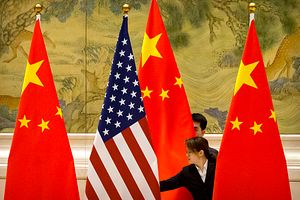Top Chinese Communist Party (CCP) leaders gathered in Beijing this week for the Fourth Plenum – a secretive meeting where CCP officials set strategy, likely including plans to surpass the United States as the world’s pre-eminent superpower. Earlier this month, the CCP showcased its military might by parading thousands of troops and its nuclear and hypersonic weapons through the streets of Beijing. The CEO of Weibo, a Chinese social media platform, captioned a photo of the D-17 hypersonic missile with “express delivery to Guam?” This is another reminder of the threat that China poses to the U.S. and the world.
For decades, China has been intently re-orienting the global economy to suit the interests and needs of Beijing. The CCP’s ideology of absolute control by the state combined with the spread of its technology-enabled authoritarianism is undermining democracy around the world and sparking a generational competition with the United States. We must responsibly counter China now or risk being subjected to their malign influence across the globe.
Core to the CCP’s agenda is control of emerging technology. From medical devices to pharmaceutical drugs and cloud computing to self-driving cars, the CCP wants its companies to command the commercial technologies that are fueling the 21st century economy. Under its Civil-Military Fusion initiative, the CCP is integrating these emerging technologies with their military and building a threatening force with advanced weaponry and capabilities.
While growing their technology arsenal, the CCP wants to be the hub of the global digital economy. It would like to see the world’s data being transmitted through hardware built by its companies, putting Beijing at the center of global trade and information flows. By taking control of critical hardware and software for next generation technologies like 5G, the CCP can increase its ability to coerce international companies, manufacturers, and even entire countries to adhere to the dictates of the CCP. There will be dire consequences should China successfully control and weaponize the global supply chain for technology. Just imagine if Americans’ personal data — from where you shop to who you text — resided on a server in Beijing.
What’s more, stolen American ideas are fueling China’s technological rise and its global ambitions. It is estimated that China steals up to $600 billion in American intellectual property annually — this rampant theft represents lost American jobs, shuttered factories, and diminished national security. American technological innovation is what makes our economy vibrant and resilient. The CCP wants to steal our technology and replace it with its own.
Though the threat of China has long been overlooked, President Donald Trump has reoriented the U.S.-China relationship to one of strategic competition and there is a bipartisan effort in Congress to hold China accountable for their malign behavior. We have worked on a bipartisan basis to reform our foreign investment screenings and export controls. By advancing legislation that secures our leadership on 5G standards, protects our companies in foreign markets, prioritizes research and development initiatives, and utilizes commerce as primary instrument of our foreign policy, we are taking steps to counter China’s dynamic challenge.
As Beijing’s autocrats gather this week, we must continue to send a clear message to the CCP that their plans to erode the foundation of our economic strength will not go unchecked by the United States of America.
Congressman Michael McCaul is the lead Republican on the House Foreign Affairs Committee.
































